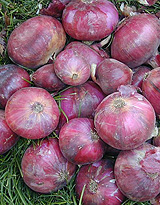This page has been archived and is being provided for reference purposes only. The page is no longer being updated, and therefore, links on the page may be invalid.
|
|
Short-Day Onions Saved for the Long Haul
By Luis PonsAugust 30, 2005
More than 70 varieties of short-day onions will be around for a long time, thanks to scientists with the Agricultural Research Service (ARS) and New Mexico State University (NMSU).
Plant geneticist Larry Robertson in the ARS Plant Genetic Resources Unit (PGRU) at Geneva, N.Y., and onion breeder Christopher Cramer at NMSU's Department of Agronomy and Horticulture led work to regenerate 75 accessions of these onions that were in danger of being lost from the National Plant Germplasm System (NPGS).
As part of NPGS, ARS' Geneva laboratory preserves material from many crop plants, including onions, to ensure a constant supply of them. It safeguards more than 1,100 onion samples from 63 countries.
PGRU was on the brink of running out of many short-day onion samples because Geneva's long day lengths in summer hampered efforts to regenerate seed.
Short-day onions bulb and flower only when day lengths are shorter than approximately 12 hours. Summer day lengths in Geneva reach 14 hours during the onions' critical growth periods.
Three years ago, Robertson acted to save these accessions by contacting Cramer to propose growing the onions on NMSU's Las Cruces campus, where key day lengths are shorter than in Geneva.
The seeds of 54 saved accessions have been sent to PGRU to be reincorporated into the collection and made available for distribution. Seventeen varieties that produced less seed than desired were retained by NMSU in order to produce additional seed from the same plants.
According to Robertson, this cooperative project has been extended for a year to provide for routine regeneration of short-day onions for the Geneva collection.
The National Plant Germplasm System is a cooperative state, federal and private effort to preserve the genetic diversity of plants. Part of the ARS-administered National Genetic Resources Program (NGRP), it helps offset genetic uniformity resulting from intensive agriculture that increases crop vulnerability to pests and stresses.
ARS is the U.S. Department of Agriculture's chief scientific research agency.

